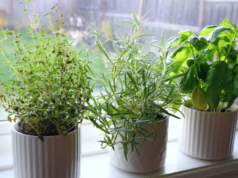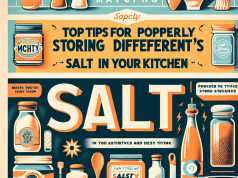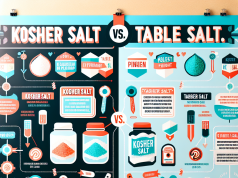Contents
Welcome to the DIY Herb Garden!
If you love cooking with fresh herbs, there’s no better way to ensure a constant supply than by growing your own herb garden. Not only is it convenient to have fresh herbs at your fingertips, but it’s also a rewarding and enjoyable hobby. Whether you have a spacious outdoor garden or just a small windowsill, you can cultivate a variety of herbs to elevate your culinary creations.
Benefits of Growing Your Own Herbs
When you grow your own herbs, you have the freedom to choose which ones to cultivate and can ensure that they are grown without the use of harmful pesticides. Additionally, fresh herbs have a more vibrant flavor compared to their dried counterparts, making your dishes even more delicious. Not to mention, having a herb garden can also add a beautiful touch of greenery to your home.
The Benefits of Growing Your Own Herb Garden
Having a herb garden at home is not only a great way to add flavor to your cooking, but it also offers numerous health benefits. Fresh herbs are packed with nutrients and antioxidants that can help boost your immune system and improve digestion. They can also elevate the taste of any dish, making your home-cooked meals more delicious and aromatic.
Choosing the Right Herbs for Your Garden
Before starting your herb garden, it’s important to consider which herbs you’d like to grow. Some popular choices for a kitchen herb garden include basil, mint, parsley, rosemary, thyme, and cilantro. You can also consider more exotic options like lemongrass, sage, or oregano, depending on your culinary preferences.
Creating a Suitable Growing Environment
Most herbs thrive in well-draining soil and sunlight. Make sure to choose a location in your home that receives at least six hours of sunlight per day. If you don’t have access to outdoor space, consider growing your herbs in small pots by a sunny window.
Caring for Your Herbs
Herbs are generally easy to care for, but each variety may have specific needs. Some herbs, like basil and mint, prefer moist soil, while others, like rosemary and thyme, prefer drier conditions. Regular watering and occasional pruning will help keep your herbs healthy and productive.
Harvesting and Using Your Herbs
Once your herbs have reached maturity, you can start harvesting them for use in your cooking. When clipping your herbs, make sure to only take what you need, leaving enough growth for the plant to continue thriving. Fresh herbs can be used in a variety of dishes, including salads, soups, sauces, and marinades.
Resources for Herb Gardening
For more information on herb gardening, visit The Old Farmer’s Almanac’s Herb Gardening Guide. This comprehensive guide covers everything from choosing the right herbs to harvesting and preserving your homegrown bounty.
Conclusion
Growing your own herb garden is a rewarding and cost-effective way to add fresh flavors to your meals. By taking the time to tend to your herbs, you’ll not only have access to high-quality ingredients, but you’ll also have the satisfaction of knowing that you’ve nurtured their growth from seed to plate. Plus, you’ll have the added benefit of having a delightful fragrance in your home!
DIY Herb Garden FAQs
What are the benefits of growing my own herb garden?
Growing your own herb garden allows you to have fresh herbs readily available for cooking. It also can save you money, as store-bought herbs can be expensive.
What do I need to start my own herb garden?
To start your own herb garden, you will need seeds or starter plants, soil, pots or a garden bed, and access to sunlight. You may also want to invest in some basic gardening tools like a trowel and watering can.
What are some easy-to-grow herbs for beginners?
Some easy-to-grow herbs for beginners include basil, mint, parsley, chives, and oregano. These herbs are relatively low-maintenance and can thrive in various growing conditions.
How often do I need to water my herb garden?
The frequency of watering your herb garden will depend on factors like the type of herb, the climate, and the type of soil. In general, aim to keep the soil consistently moist but not waterlogged. It’s a good idea to check the moisture level of the soil daily, especially during hot and dry weather.
Can I grow herbs indoors?
Yes, many herbs can be successfully grown indoors as long as they receive sufficient sunlight. Consider placing your indoor herb garden near a sunny window or using grow lights to supplement natural light.
How can I use my fresh herbs in the kitchen?
Fresh herbs can be used to enhance the flavor of a wide variety of dishes, including salads, soups, stews, marinades, and sauces. You can also use them to make flavored oils, vinegars, and butters.
The Importance of Herbs in Kitchen
Herbs play a crucial role in enhancing the flavor and nutrition of dishes. Not only do they add depth and complexity to the taste of food, but they also offer a multitude of health benefits.
Long tail keyword: Best herbs to grow in a small kitchen garden
When it comes to growing herbs in a small kitchen garden, it’s important to choose varieties that are well-suited to the limited space available. Some of the best herbs for small gardens include chives, basil, cilantro, and thyme.
If you are interested in learning more about growing herbs, you can visit this Wikipedia page for more information.
DIY Herb Garden: Growing Your Own Fresh Herbs for the Kitchen
- Choose a sunny spot for your herb garden
- Start with easy-to-grow herbs like basil, parsley, and mint
- Use well-draining soil and water your herbs regularly
- Harvest your herbs frequently to encourage new growth
- Enjoy using fresh, homegrown herbs in your cooking!
Category – Pepper, Salt and Herbs








































